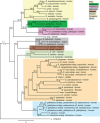Biology of Oral Streptococci
- PMID: 30338752
- PMCID: PMC6287261
- DOI: 10.1128/microbiolspec.GPP3-0042-2018
Biology of Oral Streptococci
Abstract
Bacteria belonging to the genus Streptococcus are the first inhabitants of the oral cavity, which can be acquired right after birth and thus play an important role in the assembly of the oral microbiota. In this article, we discuss the different oral environments inhabited by streptococci and the species that occupy each niche. Special attention is given to the taxonomy of Streptococcus, because this genus is now divided into eight distinct groups, and oral species are found in six of them. Oral streptococci produce an arsenal of adhesive molecules that allow them to efficiently colonize different tissues in the mouth. Also, they have a remarkable ability to metabolize carbohydrates via fermentation, thereby generating acids as byproducts. Excessive acidification of the oral environment by aciduric species such as Streptococcus mutans is directly associated with the development of dental caries. However, less acid-tolerant species such as Streptococcus salivarius and Streptococcus gordonii produce large amounts of alkali, displaying an important role in the acid-base physiology of the oral cavity. Another important characteristic of certain oral streptococci is their ability to generate hydrogen peroxide that can inhibit the growth of S. mutans. Thus, oral streptococci can also be beneficial to the host by producing molecules that are inhibitory to pathogenic species. Lastly, commensal and pathogenic streptococci residing in the oral cavity can eventually gain access to the bloodstream and cause systemic infections such as infective endocarditis.
Figures



References
Publication types
MeSH terms
Substances
Grants and funding
LinkOut - more resources
Full Text Sources
Medical

